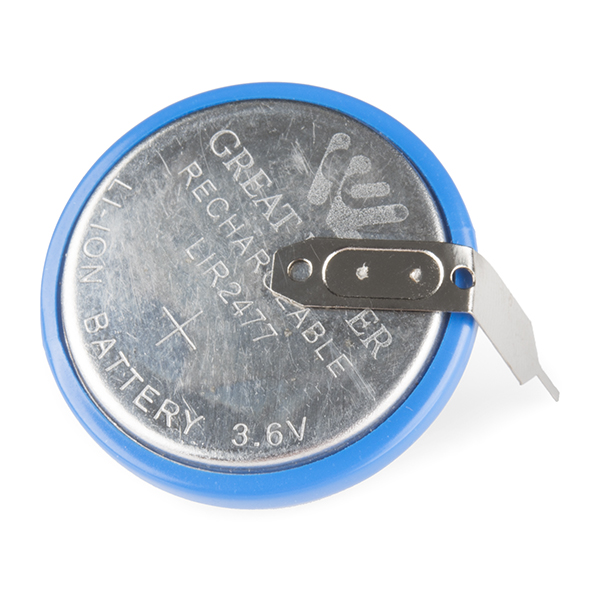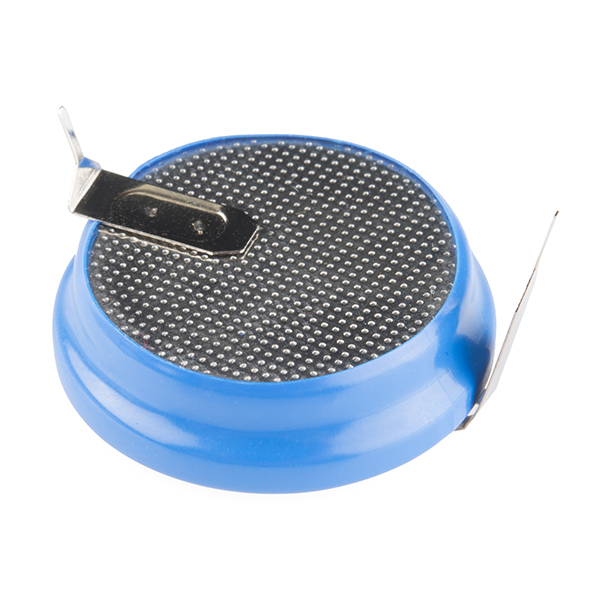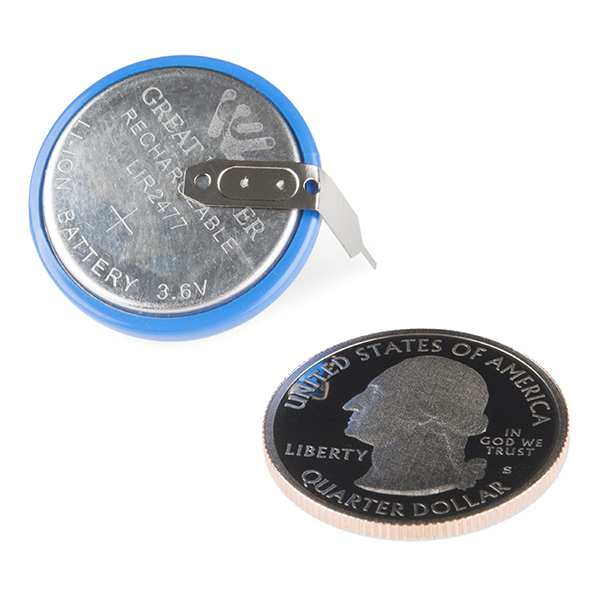Coin Cell Battery - 24.5mm (PTH LIR2477)
This is the LIR2477 rechargeable lithium ion coin cell battery. The battery is rated for 3.6V @ 160mAh and comes standard with two PTH pins tacked on to the top and bottom so a coin cell holder is not required. This battery has been used in the fabrickit product line.
Note: Due to the requirements of shipping these batteries, orders may take longer to process and therefore do not qualify for same-day shipping. Sorry for any inconvenience this may cause.
**Weight: **7g
- 24.5x7.7mm (Without pins)
Coin Cell Battery - 24.5mm (PTH LIR2477) Product Help and Resources
Core Skill: Soldering
This skill defines how difficult the soldering is on a particular product. It might be a couple simple solder joints, or require special reflow tools.
Skill Level: Rookie - The number of pins increases, and you will have to determine polarity of components and some of the components might be a bit trickier or close together. You might need solder wick or flux.
See all skill levels
Core Skill: Electrical Prototyping
If it requires power, you need to know how much, what all the pins do, and how to hook it up. You may need to reference datasheets, schematics, and know the ins and outs of electronics.
Skill Level: Rookie - You may be required to know a bit more about the component, such as orientation, or how to hook it up, in addition to power requirements. You will need to understand polarized components.
See all skill levels
Comments
Looking for answers to technical questions?
We welcome your comments and suggestions below. However, if you are looking for solutions to technical questions please see our Technical Assistance page.
Customer Reviews
4 out of 5
Based on 1 ratings:
0 of 2 found this helpful:
The quality is not stable
In this type of battery is very common defective. I buy them is not the first time and every time come across instances not workable. It is better to buy a few pieces that were holding on culling




I got the following readings on the 4 I ordered: 0V, 0V, 0.66V, 3.86V. They just let me know that they figured out that all their current stock of this product has been packaged with conductive foam, so these have been slowly discharging on the shelf. I verified this...about 5k ohms resistance across the foam pad the battery came in. Anyway, they should be replacing this with properly packaged product but wait on ordering it -- dated 11/18/2015. Posting this because I noticed they still had it listed as in stock and not on backorder--this should be updated. Also so that if any previous purchaser is wondering what happened, they have some closure. These cells aren't supposed to be allowed to fully discharge.
What would be the best way to recharge this battery?
Does this battery need an external protection circuit? I believe all the rectangular packs SF sells have them built in. If something external is needed, is there a recommended protection IC or circuit design for this?
Ordered two, one registers at .87V, the other at 1.3. These are not pre-charged. This should be noted in the product description.
Agreed. I have ordered some and the three I measured register between 0.6V and 1V. I believe batteries degrade fastest when completely discharged so make sure to charge them soon after receiving.
Can the coin cell be removed from the holder? If not, one would have to integrate a charging facility in one’s design, and that’s presumably close to impossible to do with through hole components, so to use this successfully in a design, it would take considerably more than “rookie” soldering and prototyping skills.
It looks to me like they are spot-welded on. If removal for charging is a concern then perhaps you could solder a pigtail to the battery and use that for connecting to your circuit. (Or just bare wires with spring terminals - Those are probably easier to solder.)
Alternate option: Solder the battery in place, but put a .1" jumper or DPST switch on the feed and leave a jack to connect the charger - Just switch the jumper or switch and voila! Charging without back-feeding your circuit.
Agree, it's spot-welded on; that doesn't prevent you from very carefully trimming the leads, though.